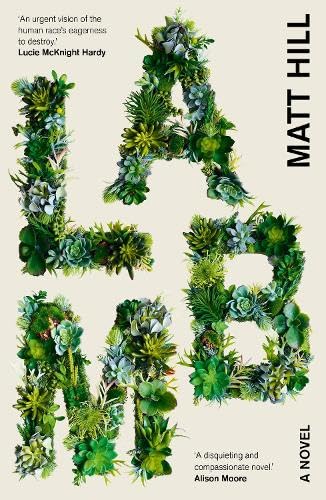Today sees the appearance of Matt Hill’s long-awaited fifth novel. Lamb is published by the Liverpool-based independent press Dead Ink, the home of Naomi Booth’s Exit Management, Gary Budden’s London Incognita and Missouri Williams’s The Doloriad, provocative, unsettling works that challenge every aspect of the status quo. Given the nature of Hill’s literary identity – northern, speculative, discomfiting yet humane – it seems inevitable that this writer and this publisher would come together eventually.
Hill made his presence felt from the moment he arrived on the scene in 2013 with The Folded Man, which was a runner-up for the Dundee International Book Prize. Set in a disturbingly near-future Manchester and ‘starring’ the superbly dislikeable Brian, The Folded Man presents a fertile clash between gritty Gibsonian futurism and a distinctly home-grown eco-noir, an ambience that persists throughout his tangentially related 2016 follow-up Graft, which was a finalist for the Philp K. Dick Award.
The two novels that followed are equally distinctive. Climate change and the post-work environment become major themes in Zero Bomb (2019) in which grieving father Remi becomes drawn into a murky world of government surveillance and anarchist plots. The Breach (2020), published on the eve of lockdown and thus denied much of the attention it deserved, is a potent mix of evocative landscape writing and post-Brexit paranoia.
Indeed, what Hill’s books have in common is an obsession with the enforced inequalities and social divides – north and south, worker and manager, government and citizen – that have come to define our disunited kingdom in the present century. Hill is too young to have fully formed memories of Thatcher in government, but his political and literary consciousness have clearly been shaped by and within the long and continuing fallout from the 1980s.

This new novel Lamb, the latest chapter in Hill’s evolving oeuvre, is as brilliant as anything he has yet written, keeping faith with his core themes of future-shock, environmental degradation and the structural imbalances tearing at the fabric of our post-truth society. Following a family tragedy, teenager Boyd and his mother Maureen flee north from Watford to the village of Sile, an eerily closeted community where Boyd feels not just out of place but actively threatened. He knows there is something amiss here, whilst amongst certain elements of the townsfolk, the suspicion begins to surface that what is wrong in Sile is Boyd himself, or more specifically his mother Maureen.
With Lamb so newly published, it would be wrong of me to reveal much more about the exact nature of Boyd’s catastrophe, except to say that the journey he embarks on is one of radical transformation. The truth of who Boyd is – WHAT Boyd is – has far wider implications than the fate of one family, and as always with Hill, the vision presented to us within the pages of this story has more to say about our unreliable present than any possible future.
One of the most arresting aspects of Hill’s fiction is its boldness in incorporating dramatic speculative ideas into deeply human stories. From The Folded Man onwards, Hill has seemed compelled to place his characters in extreme situations, to test their resilience, and thinking about this today, the book that keeps coming to mind is Mary Shelley’s Frankenstein. Like Shelley, Hill writes about responsibility, about cause and effect and the price of human arrogance. About technology run out of control, about the costly repercussions of moral failure.
Lamb is a unique blend of the personal and the political, the kind of work that reminds us how radical science fiction can be, how well it retains the power to shock and to surprise. A road trip like no other, Lamb will leave you thrilled, changed, unsettled, and still asking questions.